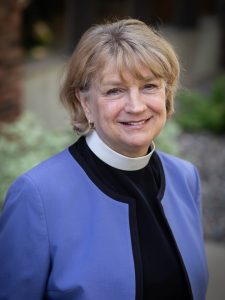 By Bishop Ann Svennungsen
By Bishop Ann Svennungsen
I distinctly remember a job interview when I served as pastor at Trinity Lutheran in Moorhead. When I asked the applicant why she wanted to work in a church, she replied, “I think it will really help my faith.”
Recently, I’ve been thinking a lot about her remarks. Sunday was Pentecost – the birthday of the church – the day the Spirit miraculously transformed fearful disciples into a loving community boldly sent to share the good news of Christ, … even to the ends of the earth.
And the Spirit is still at work. Our synod assembly in April was filled with signs of the Spirit’s ongoing presence:
- We celebrated the news that $680,000 had been raised to start the Lutheran University Nigeria – a critical ministry in a country where only 40 percent of eligible students can find a spot in college.
- We rejoiced to welcome Holy Cross Lutheran Church in Minneapolis as the newest ELCA congregation.
“In the five weeks since our synod assembly, we have also seen powerful signs of the church’s brokenness.”
And yet, in the same five weeks, we have seen powerful signs of the church’s brokenness, including the Sierra Pacific Synod’s Assembly where 56% of those gathered voted to remove their bishop from office (a vote that did not meet the required two-thirds majority). And, yesterday, we heard that our Presiding Bishop has initiated formal disciplinary charges against Bishop Megan Rohrer.
The events in Sierra Pacific point ever more vividly to the racism and bias that infect the ELCA. Our responses on social media and elsewhere reveal how easy it is to amplify bad news and partial truths. We are broken.
IN HIS LATEST book, Do I Stay Christian?, Brian McLaren (our 2015 synod assembly speaker) starts out by retelling the story of the church’s brokenness – particularly the greed, power, fear, patriarchy, racism, and discrimination that have shaped it.
But then he tells the story of two sisters – Catholic nuns who face excommunication (and the loss of all earthly possessions) because of their challenges to the church. Still, they choose to continue speaking up until the church chooses to remove them – with both grace and defiance.
And, McClaren responds to their courage, writing, “Knowing what I see and know now (about Christian history), I will remain present to my [Christian] community, neither minimizing its faults nor hating it for its faults. … [I will join those who] stay with a good-natured but firm defiance, determined to keep our integrity and speak our truth as best we can, … staying centered in genuine humility and love.”
“Martin Luther is realistic about the ‘institutional church,’ recognizing that the ‘visible church’ is a human institution marred by error, a reflection of the sinner/saints who lead it.”
The church itself – whether it’s Trinity Lutheran in Moorhead or another congregation – will not always be a place where faith is strengthened. We may (likely) be hurt by the church’s sin and brokenness. Martin Luther is realistic about the “institutional church,” recognizing that the “visible church” is a human institution marred by error, a reflection of the sinner/saints who lead it. Yet, and still, the visible church is the incarnational vessel where, in Word and Sacraments, we receive the Christ and balm of the Gospel.
So, we speak up – with defiance and humility. We hold our church accountable – our ELCA, our synod, our congregation. We repent and seek reconciliation. And, we pray, “Come, Holy Spirit.”

